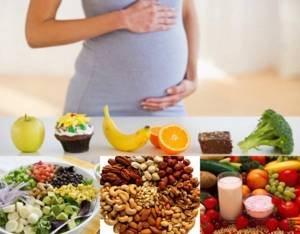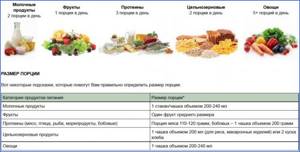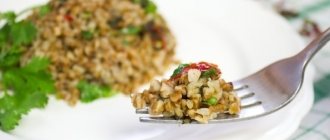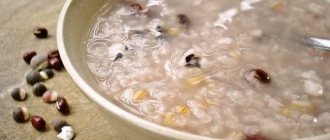Carrying a child is a magical period in a woman’s life. A rounded belly brings sublime beauty and touching to the image of a woman. Weight gain during these months is a natural process associated with the baby's development. But it’s easy to miss the obvious extra pounds during a pregnant woman’s weight gain, especially since a special wardrobe is required during this time. And after giving birth, it suddenly turns out that absolutely all the things that were waiting in the wings on the shelves have become small. How I wish at such moments I could turn back time and not eat that cake at night and that second piece of cake at lunch. Let's talk about how not to gain weight during pregnancy, because maintaining a normal weight is easier than getting rid of extra pounds.
photo from the site womanadvice.ru
How not to gain weight during pregnancy
Many women are afraid of weight gain during pregnancy.
Excess weight not only spoils your appearance, but also causes diseases and complications. Carrying a child is a crucial period; you should carefully monitor the amount you eat and control yourself. Risks of excess weight during pregnancy Expectant mothers experience fear before stepping on the scale. Some, on the contrary, do not think about numbers. Still, during pregnancy you should pay special attention to your weight and try in every possible way to control it.
Risks of excess weight while expecting a baby:
- Excess weight is dangerous due to the appearance of hypertension. A sharp jump in blood pressure can cause stroke, heart attack and premature birth. The baby may suffer from lack of air - hypoxia.
- The occurrence of late toxicosis (preeclampsia). Women experience severe nausea and vomiting, increased blood pressure, and swelling. This condition provokes placental abruption and oligohydramnios.
- Large women suffer from gestational diabetes. This disease leads to various pathologies in the fetus: accelerated growth, breathing disorders, and mental disorders.
- Excess weight is a common cause of complications during childbirth. For grade 2 and 3 obesity, doctors perform a cesarean section. If a woman gives birth on her own, she may bleed.
The list of risks goes on. Girls “in the body” must strictly follow the doctor’s recommendations in order to bear a healthy child and not harm their health.
How much does a pregnant woman gain: how kilograms are gained
In the first 2 months of pregnancy, when the fetus is still very small, the expectant mother usually does not recover. In addition, during this period she may be worried about early gestosis, characterized by dysfunction of vital organs. Another name is late toxicosis. This period is familiar to most pregnant women: nausea, vomiting, high blood pressure, swelling, bowel irregularities. Many people don’t feel like eating at all. In total, during this time the woman will gain at most 2 kilograms.
After the 20th week, weight will begin to grow weekly - approximately 300 grams will be added in 7 days. From the 30th week - up to 400 grams per week, or up to 2 kilograms per month. This means that a healthy woman gains no more than 10–12 kilograms during pregnancy. Of these, 3.5 kg (approximately) is the weight of the child. The uterus also enlarges (up to 900 g), the placenta (up to 400 g), the volume of circulating blood increases noticeably, and small fat reserves appear under the skin (up to 2200 g). They are needed to provide the baby with everything necessary and to replenish the energy expended during childbirth. Also, amniotic fluid accounts for about 900 ml. The mass of the mammary glands increases by approximately 500 grams.
Tendency to gain excess weight during pregnancy
Weight gain during pregnancy is normal.
However, girls who tend to be overweight risk serious health problems. During pregnancy, appetite improves and the woman begins to overeat. Even if you carefully control the amount you eat, the risk of gaining weight is high. Excess weight provokes hormonal changes, which also lead to the appearance of extra pounds. Finally, obese pregnant women have difficulty moving and find it difficult to maintain an active lifestyle.
These factors negatively affect the body and provoke weight gain. A woman with a tendency to be overweight risks gaining much more than others, as well as acquiring new diseases.
Weight gain rate
During pregnancy, the mother gains from 9 to 12 kg, with multiple pregnancies from 14 to 21 kg.
These are averages and may vary up or down. In the first trimester, weight increases slowly. Some girls lose weight, this is due to toxicosis. However, in the future the weight should be restored.
In the second trimester, the norm is an increase of 320 grams per week (about 1 kg per month). In the third trimester, weight grows more rapidly; a woman gains 400-500 grams per week.
A sudden weight gain or lack of weight gain should alert a young mother. You should inform your doctor about these changes
Tips and rules of nutrition
Excess weight interferes with both mother and baby. Large weight gain is due to several factors:
- Heredity, tendency to be overweight.
- Malfunctions of the body.
- Binge eating.
- Passive lifestyle.
Even if one of these factors is present, the mother may not gain much weight. It all depends on your personal attitude and diet, as well as your doctor’s instructions.
A complete absence of weight gain is impossible. Baby, amniotic fluid, placenta, uterus, increased blood volume add about 8 kg.
How to avoid gaining weight in the early stages
In the early stages of pregnancy, women experience toxicosis and loss of appetite. Some, on the contrary, constantly want to eat something unusual. The craving for flour, sweet, salty, smoked foods makes you eat more and more. Overeating contributes to the formation of fat deposits. The expectant mother must realize the problem in time and begin to control herself. It is necessary to understand that harmful products do not bring benefit, but only harm.
If the diet is balanced and rich in vitamins, it becomes easier for a woman to overcome her desires. The right decision would be to create a competent diet and think through the menu for several days in advance. Food should be nourishing and varied.
It is recommended to replace harmful foods with healthy ones. For example, chips can be replaced with bread, and a piece of cake with sugar-free marshmallows.
Recommendations for proper nutrition in late pregnancy and before childbirth
In addition to rapid weight gain, problems with the gastrointestinal tract are observed in the third trimester.
In order to feel comfortable, you must adhere to the rules of a healthy diet. You should adjust your diet and consume:
- foods rich in protein and iron (meat, fish, eggs);
- calcium-enriched foods (cottage cheese, cheese);
- more vegetables and fruits;
- foods containing vitamin E (carrots);
- dried fruits and nuts.
Carrots contain a large amount of vitamin E. It slows down the aging process, improves blood circulation, and restores the immune system. Vitamin E is useful for pregnant women because it increases tissue tone and helps restore them in the postpartum period.
In the third trimester of pregnancy, swelling often appears. They occur as a result of malfunctions in the body or drinking too much liquid. The daily water intake should not exceed 1 liter. The expectant mother needs to limit her salt intake. Foods with high water content should be excluded: tomatoes, watermelons, melons. A woman needs to give up fried, smoked, and spicy foods.
Ways to maintain your figure during pregnancy
You can fully recover and get into shape only a few months after giving birth. But what a woman does during pregnancy is of great importance for her figure.
Moderate physical activity, a well-planned diet and drinking regime are important components of the daily routine that help maintain your figure.
You should avoid late meals. Limit liquids after 18:00 hours.
To reduce the risk of stretch marks on the skin of the abdomen and thighs, you need to use moisturizing oils. Another secret to elasticity and beauty of the skin is a contrast shower. Under no circumstances should the water be hot: a cold stream should be replaced by a warm one.
Skin needs to be taken care of systematically.
Proper nutrition and advice from nutritionists for pregnant women to avoid gaining excess weight

You should exclude products containing flavorings and other additives: fast food, processed foods, popcorn, chips, yoghurts with fillers. Fresh products that have undergone minimal heat treatment will benefit the baby and mother. In addition to eating the “right” foods, nutritionists recommend remembering several conditions:
- Eat small meals. The expectant mother should eat 5-6 times a day, the usual portions should be reduced and 2-3 snacks added.
- Control the amount of calories consumed, do not eat more than 2500-2700 Kcal.
- Replace simple carbohydrates with complex ones. The latter take longer to digest, as a result, the body does not feel hunger for a long time.
- Arrange fasting days, but not more often than once every 3 weeks.
- Limit the amount of food consumed in the evening.
Foods you can snack on

The snack should be light and nutritious. Don't forget that a snack is an additional meal. Having the right snack will help reduce your appetite and prevent you from eating too much during your main meal. Healthy snack options:
- Fruits and berries (seasonal).
- Fresh vegetables. Cucumber and carrots must be cut into strips and a sauce made from low-fat yogurt and herbs.
- Dried fruits and nuts.
- Fruit bars without sugar.
- Low-fat cottage cheese. Cottage cheese dishes are varied: cheesecakes, casseroles, lazy dumplings, etc.
- Whole grain bread (bread) with cottage cheese and lightly salted fish.
- Roll of lavash (without yeast) with chicken breast and fresh vegetables.
The calorie content of a snack should not be more than 200 Kcal. This will provide the body with energy and will allow you not to feel hungry until your next meal. What should be included in the diet of a pregnant and lactating woman?
Protein is the main building element for a small body. Pregnant and lactating girls should increase its amount in their diet. Be sure to eat meat, fish, and dairy products.
Folic acid is important for nursing and pregnant women. Vitamin B9 helps in the development of the fetal skeleton and ensures normal growth rates. Foods rich in folic acid: liver, spinach, legumes, greens, eggs, potatoes, corn.
Vitamin C is necessary to maintain immunity and protect the body of mother and child from infections. Citrus fruits contain the most vitamin C, but it is not recommended to eat them after childbirth. It is better to replace oranges and lemons with rosehip infusion.
You should eat more fresh vegetables and fruits; they contain all the necessary vitamins and microelements.
Portions
Each meal should be reduced by 20%. The largest amount of kcal should come at breakfast, dinner should be as light as possible and consist of protein and vegetables.
Food of animal origin should be no larger than the palm of your hand, a portion of vegetables should be the size of a fist, and carbohydrate foods should be the size of a handful. Number of meals
Expectant mothers should eat 5-6 times a day. The interval between meals is no more than 4 hours. Be sure to start your morning with a nutritious breakfast; it should be high in calories. The last meal is taken 2 hours before bedtime. Late night snacks
A woman who restricts herself in food may experience an obsessive feeling of hunger at night. A late-night snack should not consist of heavy food. Perfect option:
- kefir, yogurt;
- cottage cheese;
- a small amount of cheese.
“Late-night snacking” is not the norm, so don’t get carried away. You should carefully consider your menu and edit it based on the basic rules of healthy eating.
Proper nutrition for metabolic disorders and thyroid diseases
Improper nutrition leads to metabolic disruptions, which provoke problems with the cardiovascular system and pancreas. The following rules help normalize metabolism in the body:
- eat often in small portions;
- do not abuse “night snacks”;
- spend more time outside;
- drink enough water (but not too much);
- eat more protein.
Diseases of the thyroid gland affect the course of pregnancy, they cause developmental pathologies, hypothyroidism, thyroiditis, etc. To determine the level of thyroid hormones, a TSH test is performed. To prevent thyroid diseases, you need to eat:
- products enriched with iodine (sea fish, seaweed, dates, prunes, currants, eggplants, cucumbers);
- foods containing Omega-3 (olive oil, avocado);
- foods rich in vitamin D (cottage cheese, fish liver).
Diet for every day and holidays
A pregnant woman's diet should be balanced. The daily menu must be prepared based on the rules of healthy eating. On weekdays this is quite simple, but on weekends and holidays the situation changes. There are a lot of “useless” dishes around that you really want to try. In order to overcome this craving, you need:
- Replace salad dressings with light yogurt sauces. As a rule, the ingredients in popular salads and snacks are not harmful; fatty dressings have a negative effect on the body.
- Avoid fried hot foods and choose meat and fish prepared in other ways. If the craving for fried food is difficult to overcome, you should choose a dish cooked on the grill without adding oil.
- Cakes and pastries should be replaced with homemade sugar-free baked goods. You can bring this dessert with you when visiting.
What can you eat
The main part of the diet should be healthy food. It is important to pay attention to the composition of each product. It is recommended to include the following ingredients in the menu:
- nuts;
- seeds, raw;
- low fat dairy products;
- bird;
- red meat;
- sea and river fish;
- porridge;
- grain bread;
- fruits;
- berries;
- vegetable dishes;
- green and herbal teas.
You are allowed to consume up to 10 g of butter per day. When choosing meat products, you should give preference to varieties with low fat content; the fat is cut off. The skin is removed from the bird.
The ideal meat would be lamb without fat. It helps maintain hemoglobin levels in the blood. To improve the taste, you can add bay leaf, sesame seeds, dill with parsley or cinnamon.
Consequences of excess weight for a woman in labor

Excess weight causes problems during and after childbirth. The most common ones include:
- post-term pregnancy or early birth;
- weak labor activity;
- phlebeurysm;
- complications after cesarean section;
- urinary tract infections;
- rupture of amniotic fluid.
Excess weight is dangerous for both the expectant mother and the baby. In order to protect yourself, you should adhere to some rules and limit yourself. Health is the most important thing a woman and a small child have.
Active lifestyle

Movement during pregnancy is very beneficial for health and body, but only if there are no serious contraindications to it.
Moderate physical activity will help prepare the body for childbirth.
Prohibited sports activities include:
- traumatic sports (skating, skiing);
- lifting weights;
- Horseback Riding;
- diving.
Allowed:
- yoga;
- swimming;
- a set of breathing exercises.
At home, you can perform body tilts to the right and left, cross steps, neat bends forward and bends back. If pain occurs while performing exercises, you should stop immediately and consult a doctor.
Be sure to read: Menu for a nursing mother in the first month for every day: recipes, products for each week











